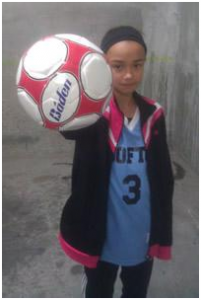“Don’t be so sensitive” – Bruce Reyes-Chow
 Read Bruce’s other essays, “Ten to Read, Hear and See About Race” and “I don’t mean to be racist, but…“
Read Bruce’s other essays, “Ten to Read, Hear and See About Race” and “I don’t mean to be racist, but…“
An excerpt (pre-final edit) from Bruce’s upcoming book, “But I don’t see you as Asian”: Curating Conversations About Race.
My middle daughter, Abby, is a soccer player. She has played since kindergarten and is the kid that we have to constantly ask to “stop kicking the ball in the house” as she is always dribbling some spherical item off of any and every surface she can – including unsuspecting sisters and parental units.
We love her passion and dedication, but seriously, after an hour of “thunk, thunk, thunk” against the wall, it gets old.
Abby is also really sensitive.
From an early age she has always been deeply intuitive and empathetic to the point that we have never had to scold her or raise our voice when she has gotten into trouble. One time we busted her standing on the counter – at the direction of her older sister, we later found out – poised to dig into the sugar jar. We needed to only give her a disappointed look, say her name, with just a touch of disapproval, and she melted into a puddle of tears.
Oh, our sweet, sensitive Abby.
Recently, this same girl came walking off the soccer field after the opposing team soundly crushed her middle school soccer team.
Abby was in tears.
We have never been the “you need to suck it up” kind of parents, but I admit, there have been times when I have pushed too hard to find out what’s wrong just because I wanted to fix it. I have only made things worse. Shocking, I know.
But here I went again, I began to talk to her a bit about her ability take things in stride, especially as she was starting to play against older, more experienced players.
Without getting too far into my lecture, Abby stopped me and said, “Dad, I am NOT crying because I am sad, I’m crying because I’m angry.”
And then she added, “Lest anyone think I’m a sissy.”
My need to have her stop being so “sensitive,” while I would love to think it was purely about me wanting to toughen my baby up, in truth, it was about my own obliviousness to what she was feeling and why. What I saw as weakness and a disproportionate reaction to disappointment, was instead was her response to a deeply felt emotion that manifested itself through tears.
I really didn’t need to do anything, but let her be. Sure, she might have to deal with others as they reacted to her tears, but there was absolutely no need for me to fix her, to dismiss her reactions or to try and make things better.
All I needed to do was listen.
In the same way, I know that when I am told, and I have been told, “don’t be so sensitive” when my response to a racial incident is outwardly passionate, even emotional, these words have not generally been delivered with my well-being in mind. It is usually said because someone else can’t handle the reaction or it creates too much tension in the room.
When we respond to a genuine reaction whether it is anger, fear or sadness, we are essentially saying to that person, “Emotions bad. Emotions uncomfortable. Please stop.”
I can just about guarantee that responding to someone who is reacting negatively to a racial incident, by saying “Don’t be so sensitive” will not lessen the tension in the room – more likely such response will raise it – and in the end does not “fix” anything. In fact, what this response does is communicate the idea that ones reaction is not valid so the concerns at the heart of the matter are probably not going not be heard. Yes, there may be a time to discuss and even challenge the assumptions, but in the moment to respond with, “Don’t be so sensitive” will result in feelings of resentment, distrusted and further distancing.
Sometimes, in the face of that which we feel is uncomfortable, all we need to do is listen.
Bruce Reyes-Chow is the author of The Definitive-ish Guide for Using Social Media in the church and the soon-to-be-released, “But I don’t see you as Asian”: Curating Conversations about Race. He can be found online on twitter at @breyeschow, on facebook at @breyeschowpage and/or on his blog at www.reyes-chow.com.


Well said Bruce! Thanks for the reminder that listening is a key ingredient to understanding and empathy. Dismissing feelings and emotion around “racial incidents” has been the M.O. for people in the dominant culture. I’m so glad to read that you agree it is the wrong approach. Bless you!
Very welcome.